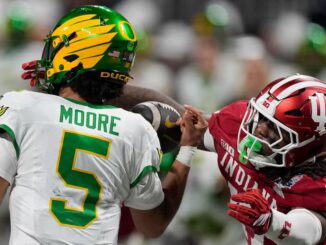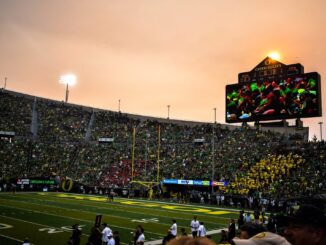
When Willie Taggart was asked on Thursday at his introductory press conference what struck him about the Ducks when he was an assistant coach at Stanford under Jim Harbaugh, he gave a somewhat surprising answer.
“When you look at Oregon… you expect a team that is physical. When I was at Stanford, they were spread out, but they were physical.”
That should make Ducks fans’ hearts sing.
There was plenty to like from Taggart’s first press conference at Oregon. He was affable, engaging, and animated. He talked about being his own man in Eugene, and respecting the program’s tradition while pushing it forward.
But it was that answer – physicality – that should have Ducks fans most excited about Taggart. Whether he knows it yet or not, he put his finger on one of the most important and overlooked aspects of what made Oregon so good under Chip Kelly.
Those teams were physical. They had moxie. Their leaders were the Jeff Maehls, and Casey Matthews, and Eddie Pleasants – undersized, undervalued, and as tough as they come.
Those guys were nails. It was Matthews who stripped Cam Newton to keep Oregon alive in the National Championship game, and Maehl who made an absurd catch to convert the game-tying two-point conversion.
It’s an important point: The Ducks’ success over the last two decades wasn’t about getting blue-chippers. It was about an offensive coordinator from New Hampshire. It was about a three-star quarterback from Hawaii.
This is the same program that won a Pac 10 championship with a quarterback in Jeremiah Masoli whose primary offensive weapon was his ability to run over defenders.
Those Ducks teams weren’t feared because they were fast. They were feared because they were relentless.
Oregon is well equipped to win nine games a year who matter who its coach is. This is a top-25 program. But if this coaching search showed us anything, it’s that this isn’t a top-5 program.
To compete for national championships, the Ducks have to be innovative. They have to find and manufacture talent and grit where USC and Washington don’t.
Mark Helfrich wasn’t able to do that. Not by a long shot. His tenure ended with the Ducks getting punched in the mouth by Oregon State in the Civil War, but Helfrich was in trouble the moment De’Anthony Thomas went on the radio late in his first season and said that making the Rose Bowl didn’t really matter to the Ducks.
He was in trouble when Utah put up 62 points at Autzen Stadium. Oregon went soft. It wasn’t Helfrich’s only problem, but it mattered.
Taggart should change that. Players will want to play for him. That much was obvious from the first news conference.
Taggart is a good hire for the Ducks. You don’t win at Western Kentucky unless you’re good. Same goes for South Florida, where Taggart became the first coach in program history to win ten games in a single season.
Was he Oregon’s first choice? Maybe not. A full five days passed after Taggart was interviewed before he was offered the job. Reports had the Ducks targeting Temple coach Matt Rhule, who opted for Baylor.
Did Taggart land the job because he came cheap? At $3.2 million per year, Oregon’s new coach will make roughly a million dollars per year less than another rumored finalist, Dan Mullins, is already making at Mississippi State.
But if Dana Altman’s tenure as Oregon basketball coach has taught us anything, it’s that it doesn’t matter how a coach enters the picture. Taggart got the job. Now, he’s going to get to do the job.
This is a good step for the Ducks. It’s different. It’s a coach with a point to prove. And it’s someone who understands that first ingredient for football success is toughness – the trait that Gary Andersen has spent a full two years installing in Corvallis.
Taggart won’t be afraid to be his own man. As he said on Thursday, he doesn’t know to do anything different. At the very least, Taggart will make the program his in a way that Helfrich never did.
Taggart’s USF team was a blast this year. They put up a ton of offense, they took risks, and they played with tenacity. Sound familiar?
At its best, Oregon Football is bold. It’s loud. And it will run you over. Willie Taggart? He’s off to a good start.



